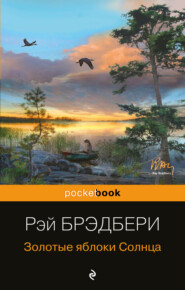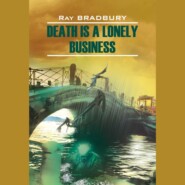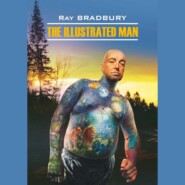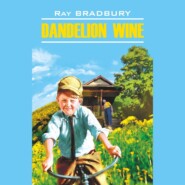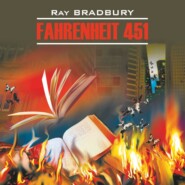По всем вопросам обращайтесь на: info@litportal.ru
(©) 2003-2024.
✖
Zen in the Art of Writing
Автор
Год написания книги
2018
Настройки чтения
Размер шрифта
Высота строк
Поля
Out on the margin of these nouns, I blundered into a science-fiction story that was not a science-fiction story. My title was ‘R is for Rocket’. The published title was ‘King of the Grey Spaces’, the story of two boys, great friends, one elected to go off to the Space Academy, the other staying home. The tale was rejected by every science-fiction magazine because, after all, it was only a story about friendship being tested by circumstance, even though the circumstance was space travel. Mary Gnaedinger, at Famous Fantastic Mysteries, took one look at my story and published it. But, again, I was too young to see that ‘R is For Rocket’ would be the kind of story that would make me as a science-fiction writer, admired by some, and criticized by many who observed that I was no writer of science fictions, I was a ‘people’ writer, and to hell with that!
I went on making lists, having to do not only with night, nightmares, darkness, and objects in attics, but the toys that men play with in space, and the ideas I found in detective magazines. Most of the detective material I published in my twenty-fourth year in Detective Tales and Dime Detective is not worth rereading. Here and there, I fell over my own shoelaces and did a nearly good job of remembering Mexico, which scared me, or downtown Los Angeles during the Pachucho riots. But it would take me the better part of forty years to assimilate the detective/mystery/suspense genre and make it work for me in my novel, Death Is a Lonely Business.
But back to my lists. And why go back to them? Where am I leading you? Well, if you are a writer, or would hope to be one, similar lists, dredged out of the lopside of your brain, might well help you discover you, even as I flopped around and finally found me.
I began to run through those lists, pick a noun, and then sit down to write a long prose-poem-essay on it.
Somewhere along about the middle of the page, or perhaps on the second page, the prose poem would turn into a story. Which is to say that a character suddenly appeared and said, ‘That’s me’; or, ‘That’s an idea I like!’ And the character would then finish the tale for me.
It began to be obvious that I was learning from my lists of nouns, and that I was further learning that my characters would do my work for me, if I let them alone, if I gave them their heads, which is to say, their fantasies, their frights.
I looked at my list, saw SKELETON, and remembered the first artworks of my childhood. I drew skeletons to scare my girl cousins. I was fascinated with those unclothed medical displays of skulls and ribs and pelvic sculptures. My favorite tune was ‘’Tain’t No Sin, To Take Off Your Skin, and Dance Around in Your Bones.’
Remembering my early artwork and my favorite tune, I ambled into my doctor’s office one day with a sore throat. I touched my Adam’s apple, and the tendons on each side of my neck, and asked for his medical advice.
‘Know what you’re suffering from?’ asked the doc.
‘What?’
‘Discovery of the larynx!’ he crowed. ‘Take some aspirin. Two dollars, please!’
Discovery of the larynx! My God, how beautiful! I trotted home, feeling my throat, and then my ribs, and then my medulla oblongata, and my kneecaps. Holy Moses! Why not write a story about a man who is terrified to discover that under his skin, inside his flesh, hidden, is a symbol of all the Gothic horrors in history – a skeleton!
The story wrote itself in a few hours.
A perfectly obvious concept, yet no one else in the history of writing weird tales had ever scribbled it down. I fell into my typewriter with it and came up with a brand new, absolutely original tale, which had been lurking under my skin since I first drew a skull and crossbones, aged six.
I began to gain steam. The ideas came faster now, and all of them from my lists. I prowled up in my grandparents’ attics and down in their basements. I listened to the middle-of-the-night locomotives wailing across the northern Illinois landscape, and that was death, a funeral train, taking my loved ones away to some far graveyard. I remembered five o’clock in the morning, predawn arrivals of Ringling Brothers, Barnum and Bailey, and all the animals parading by before sunrise, heading for the empty meadows where the great tents would rise like incredible mushrooms. I remembered Mr. Electrico and his traveling electric chair. I remembered Blackstone the Magician dancing magical handkerchiefs and vanishing elephants on my hometown stage. I remembered my grandfather, my sister, and various aunts and cousins, in their coffins and gone forever in the tombyards where the butterflies settled like flowers on the graves and where the flowers blew away like butterflies over the stones. I remembered my dog, lost for days, coming home late on a winter night with snow and mud and leaves in his pelt. And the stories began to burst, to explode from those memories, hidden in the nouns, lost in the lists.
My remembrance of my dog, and his winter pelt, became ‘The Emissary’, the story of a boy, sick in bed, who sends his dog out to gather the seasons in his fur, and report back. And then, one night, the dog comes back from a journey to the graveyard, and brings ‘company’ with him.
My listed title THE OLD WOMAN became two stories, one ‘There Was an Old Woman’, about a lady who refuses to die and demands her body back from the undertakers, defying Death, and a second tale, ‘Season of Disbelief’, about some children who refuse to believe that a very old woman was ever young, was ever a girl, a child. The first story appeared in my first collection, Dark Carnival. The second became part of a further word-association test I gave myself, called Dandelion Wine.
We can surely see now, can’t we, that it is the personal observation, the odd fancy, the strange conceit, that pays off. I was fascinated by old people. I tried to solve their mystery with my eyes and young mind but was continually astounded to realize that once upon a time they had been me, and some day up ahead I would be them. Absolutely impossible! Yet there the boys and girls were, locked in old bodies, a dreadful situation, a terrible trick, right before my gaze.
Pilfering from my list, again, I seized out the title THE JAR, the result of my being stunned at an encounter with a series of embryos on display in a carnival when I was twelve and again when I was fourteen. In those long-gone days of 1932 and 1934, we children knew nothing, of course, absolutely nothing about sex and procreation. So you can imagine how astounded I was when I prowled through a free carnival exhibit and saw all those fetuses of humans and cats and dogs, displayed in labeled jars. I was shocked by the look of the unborn dead, and the new mysteries of life they caused to rise up in my head later that night and all through the years. I never mentioned the jars and the formaldehyde fetuses to my parents. I knew I had stumbled on some truths which were better not discussed.
All of this surfaced, of course, when I wrote ‘The Jar’, and the carnival and the fetal displays and all the old terrors poured out of my fingertips into my typewriter. The old mystery had finally found a resting place, in a story.
I found another title in my list, THE CROWD. And, typing furiously, I recalled a terrible concussion when I was fifteen and ran from a friend’s house at the sound, to be confronted by a car that had hit an obstruction in the street and rocketed into a telephone pole. The car was split in half. Two people lay dead on the pavement, another woman died just as I reached her, her face ruined. Another man died a minute later. Still another died the next day.
I had never seen anything like it. I walked home, bumping into trees, in shock. It took me months to get over the horror of that scene.
Years later, with my list before me, I remembered a number of peculiar things about that night. The accident had occurred at an intersection surrounded on one side by empty factories and a deserted schoolyard, and on the opposite side, by a graveyard. I had come running from the nearest house, a hundred yards away. Yet, within moments, it seemed, a crowd had gathered. Where had they all come from? Later on in time, I could only imagine that some came, in some strange fashion, out of the empty factories, or even more strangely, out of the graveyard. After typing for only a few minutes, it came to me that, yes, this crowd was always the same crowd, that it gathered at all accidents. These were victims from accidents years ago, doomed to come back and haunt the scene of new accidents as they occurred.
Once I hit on this idea, the story finished itself in a single afternoon.
Meanwhile, the carnival artifacts were gathering closer, their great bones starting to thrust up through my skin. I was making longer and longer prose poem excursions about circuses that arrived long after midnight. During those years, in my early twenties, prowling a Mirror Maze on the old Venice Pier with my friends Leigh Brackett and Edmond Hamilton, Ed suddenly cried, ‘Let’s get out of here, before Ray writes a story about a dwarf who pays his way in here every night so he can stand and make himself tall in the big stretch mirror!’ ‘That’s it!’ I shouted, and ran home to write ‘The Dwarf’. ‘That’ll teach me to shoot off my mouth,’ said Ed, when he read the story the next week.
THE BABY on that list was, of course, me.
I remembered an old nightmare. It was about being born. I remembered lying in my crib, three days old, wailing with the knowledge of being thrust out into the world; the pressure, the cold, the shrieking into life. I remembered my mother’s breast. I remembered the doctor, on the fourth day of my life, bending over me with a scalpel to perform circumcision. I remembered, I remembered.
I changed the title from THE BABY to ‘The Small Assassin’. That story has been anthologized dozens of times. And I had lived the story, or part of it, from my first hour of life onward, and only truly remembered and nailed it down in my twenties.
Did I write stories based on every single noun in my pages and pages of lists?
Not all. But most. THE TRAP DOOR, listed way back in 1942 or ’43, didn’t surface until three years ago, as a story in Omni.
Another story about me and my dog took more than fifty years to surface. In ‘Bless Me, Father, For I Have Sinned’, I went back in time to relive a beating I had given my dog when I was twelve, and for which I had never forgiven myself. I wrote the story to at last examine that cruel, sad boy and put his ghost, and the ghost of my much-loved dog, to rest forever. It was the same dog, incidentally, who brought ‘company’ back from the graveyard in The Emissary.
During these years, Henry Kuttner, along with Leigh, was my teacher. He suggested authors—Katherine Anne Porter, John Collier, Eudora Welty—and books—The Lost Weekend, One Man’s Meat, Rain in the Doorway—to be read and learned from. Along the way, he gave me a copy of Winesburg, Ohio, by Sherwood Anderson. Finishing the book, I said to myself, ‘Someday I would like to write a novel laid on the planet Mars, with somewhat similar people.’ I immediately jotted down a list of the sorts of folks I would want to plant on Mars, to see what would happen.
I forgot Winesburg, Ohio and my list. Over the years, I wrote a series of stories about the Red Planet. One day, I looked up and the book was finished, the list complete, The Martian Chronicles on its way to publication.
So there you have it. In sum, a series of nouns, some with rare adjectives, which described a territory unknown, an undiscovered country, part of it Death, the rest Life. If I had not made up these prescriptions for Discovery I would never have become the jackdaw archaeologist or anthropologist that I am. That jackdaw who seeks bright objects, odd carapaces and misshapen femurs from the boneheaps of junk inside my head, where lay strewn the remnants of collisions with life as well as Buck Rogers, Tarzan, John Carter, Quasimodo, and all the other creatures who made me want to live forever.
In the words of the old Mikado song, I had a little list, save it was a long one, which led me into Dandelion Wine country and helped me move the Dandelion Wine country up to Mars, and ricocheted me back into dark wine territory as Mr. Dark’s night train arrived long before dawn. But the first and most important pileup of nouns was the one filled with leaves whispering along the sidewalks at 3:00 A.M. and funerals wheeling by on empty railtracks, following, and crickets that suddenly, for no reason, shut up, so you could hear your own heart, and wish you couldn’t.
Which leads us to a final revelation—
One of the nouns on my list in high school was The Thing, or, better yet, The Thing at The Top of The Stairs.
When I was growing up in Waukegan, Illinois, there was only one bathroom; upstairs. You had to climb an unlit hall halfway before you could find and turn on a light. I tried to get my dad to keep the light on all night. But that was expensive stuff. The light stayed off.
Around two or three in the morning, I would have to go to the bathroom. I would lie in bed for half an hour or so, torn between the agonized need for relief, and what I knew was waiting for me in the dark hall leading up to the attic. At last, driven by pain, I would edge out of our dining room into that hall, thinking: run fast, leap up, turn on the light, but whatever you do, don’t look up. If you look up before you get the light on, It will be there. The Thing. The terrible Thing waiting at the top of the stairs. So run, blind; don’t look.
I ran, I leaped. But always, I couldn’t help it, at the last moment, I blinked and stared into the awful darkness. And it was always there. And I screamed and fell back downstairs, waking my parents. My dad would groan and turn over in bed, wondering where this son of his had come from. My mother would get up, find me in a scrambled heap in the hall, and go up to turn on the light. She would wait for me to climb up to the bathroom and come back down to have my tear-stained face kissed and my terrified body tucked in bed.
The next night and the next night and the night after that, the same thing happened. Driven mad by my hysteria, Dad got out the old chamber pot and shoved it under my bed.
But I was never cured. The Thing remained there forever. Only moving West when I was thirteen got me away from that terror.
What have I done, recently, about that nightmare? Well…
Now, very late in time, The Thing is standing up at the top of the stairs, still waiting. From 1926 to now, in the spring of 1986, is a long waiting. But at last, gleaning my ever dependable list, I have typed the noun out on paper, adding ‘The Stairs,’ and I have finally faced up to the dark climb and the Arctic coldness held in place for sixty years, waiting to be asked to come down through my frozen fingertips and into your bloodstream. The story, associated out of memory, was finished this week, even as I wrote this essay.
I leave you now at the bottom of your own stair, at half after midnight, with a pad, a pen, and a list to be made. Conjure the nouns, alert the secret self, taste the darkness. Your own Thing stands waiting ’way up there in the attic shadows. If you speak softly, and write any old word that wants to jump out of your nerves onto the page…
Your Thing at the top of your stairs in your own private night…may well come down.
1986
HOW TO KEEP AND FEED A MUSE (#ulink_ee3bce94-1860-5456-be84-b00975e25386)
It isn’t easy. Nobody has ever done it consistently. Those who try hardest, scare it off into the woods. Those who turn their backs and saunter along, whistling softly between their teeth, hear it treading quietly behind them, lured by a carefully acquired disdain.
We are of course speaking of The Muse.









